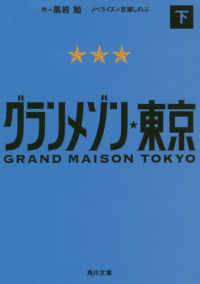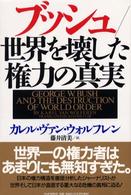- ホーム
- > 洋書
- > 英文書
- > Literary Criticism
Full Description
Combining anatomies of textual examples with broader contextual considerations related with the social, political and economic developments of post-Mao China, Xiaoping Wang intends to explore newly emerging social and cultural trends in contemporary China, and find the truth content of Chinese society and culture in the age of global capitalism.
Through in-depth textual analyses covering a variety of media, ranging from fiction, poetry, film to theoretical works as well as cultural phenomena which mirror social and cultural occurrences and reflect the present ideological proclivities of the Chinese society, this study offers timely interpretations of China in the age of globalization, its political inclinations, social fashions and cultural tendencies, and provides thought-provoking messages of China's socio-economic and political reality.
Contents
Acknowledgements
List of Figures
Introduction: Mapping the Multivalence of Contemporary Chinese Culture in the Age of Global Capitalism
1 Post-New Period, Postmodernism and Postsocialism
2 Raymond Williams' Three Cultures and the Chinese Variations
3 Structural Outline of the Five Features
part 1: The Structure of Feeling of the Traditional Socialist Era
1 A Lyrical Poet in the Era of Postsocialism: On Some Motifs of Fanken Chen's Poems
1 Attachment to a "Cultural China" and Yearning for a "Political China"
2 A Heroic Complex with the Plebeian Consciousness
3 The Motifs of Patriotism and Homesickness
4 Affective Economy and the Spiritual World of the Socialist Era
5 Conclusion
2 On the Historical-Cultural Connotations of "Chinese New Poetry": Fu Tianhong's Poems as a Case-Study
1 The Formation of the Rebellious Personality and Critical Consciousness
2 Pioneering Spirit, Perseverance and the Desire for Freedom
3 Critique of the Alienation of a Commercialized Society
4 Historical Retrospection and Social Activities
5 Conclusion
part 2: The Historical Consciousness of the New Liberal Humanism
3 Anatomizing China's "Avant-Garde Fiction": Articulating Historical Experience in Formal Experimentation
1 Ma Yuan: The Dispersion of Meaning during Secularization
2 Ge Fei: Disintegration and Dispersion of the Subject
3 Yu Hua: Historical Projection of a Post-Revolutionary Secular Society
4 Su Tong: Retrospection on Revolution by the New Bourgeois Class
5 Conclusion
4 Sampling the "New Historical Fiction": White Deer Plain as a Representative Text of New Historicism
1 A Patriarchal Clan System Consisting of Master-Slave Relationships
2 The Opening of the Gate of Desire
3 Three Rebels Fighting against Existing Institutions
4 Three Political Forces: An Incomprehensive Representation
5 A Rebel's Tragic Ending and the Incompleteness of History
6 The Textual Blankness and the Vacancy of Political Belief
7 "Cultural-Psychological Structure" and the Culturalist Mentality
8 Historical Revisionism and New Historicist Fiction
9 Conclusion
part 3: From Post-Revolutionary Passion to Postmodern Consumerism
5 Two Kinds of Bildungsroman: On the Avant-Garde Films of China's Sixth-Generation Auteurs
1 Dirt (1992): A Bildungsroman of Youth in the Early 1990s
2 The Making of Steel (1997): Why Could the Steel Not Be Successfully Made?
3 Conclusion
6 "Postmodern" Love Stories: Articulating the Self-Consciousness of the Entrepreneurial Class in China's Pop Cinema
1 A Hedonistic and Yuppy Life Philosophy: Romance on Lushan Mountain 2010 as a Tale of China's Entrepreneurial Class
2 Nihilists and the Pragmatic Principle: So Young (2013) as a Symptomatic "Youth Film"
part 4: Middle Class Tastes and Intellectual Trends
7 Making a Historical Fable: The Narrative Strategy of Lust, Caution and Its Social Repercussions
1 A Précis of the Surface Plotline
2 Projection of Social Institutions in Historical Representation
3 Displacement of Party Politics by Sexual Politics
4 Appropriation of Historical Allegory through Identity Deconstruction
5 Conclusion
6 Coda
8 Social Democracy or Neoliberal Freedom? Globalization and Contemporary Chinese Intellectual Thought
1 Dialectics of Postmodernism and (Post-)Nationalism
2 Cooperation of Neo-Statism and "Corporatism"
3 Conflicts between New Left and New Right
4 Outcry for New Socialism and the Urge for Neoliberal Capitalism
5 Conclusion
part 5: Cultural Identity and Subjectivity in the Age of Global Capitalism
9 The Exploration of "Cultural Politics" and Its Crossroads: On the Discussions of "Chinese Identity" in the Era of Globalization
1 Why to Take German Thinkers as the Object of Research?
2 Totality and the Dialectics of Historical Materialism
3 The Dialectic between Universality and Particularity
4 Cultural Diversity and Pluralism
5 How to Transcend the Nation-State System and Rebuild Continuity?
6 What is Cultural Politics?
7 Tensions and Dilemmas: Whose Cultural Politics?
8 Conclusion
10 Establishing the Subjectivity of Modern Chinese Culture: Zhou Ning's Research as a Case Study
1 Critique of Sinologism and Modern Academic Institutions
2 From "Study of the Chinese Image in the West" to "Cross-Cultural Study"
3 The Problems of "Self-Orientalization" and "Universal Value"
4 The Pitfalls of Genealogical Study and Culturalist Mentality
5 Exploring the Subjectivity of Modern Chinese Culture
6 Conclusion
Conclusion: In Search of the Renaissance of China's Socialist Culture
Selected Bibliography
Index








